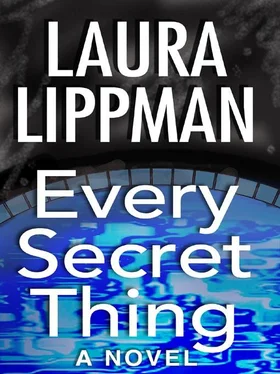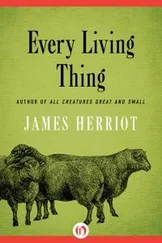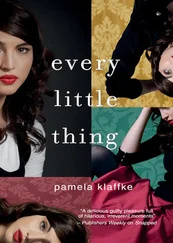Ronnie could never yell at a customer, of course. The owners, who dropped in unexpectedly, would have fired her on the spot if they heard her being rude or disrespectful. But she had an ally in Clarice, who also disliked people who expected special treatment. Especially white people, suburban mothers like this one, who stopped by on their way to somewhere, forever in a hurry, always making special requests. Clarice hated white people, period.
Which was funny, because Clarice was more white than black. She was a black woman whose color had ebbed away, leaving splotches of brown and dark brown on her ghostly face and neck. Apparently she had whatever disease Michael Jackson was always pretending to have. Clarice hated Michael Jackson, too. She had confessed to Ronnie that she disliked white people in general, whereas she hated black people on an individual basis. She said everyone was this way, so it wasn’t really prejudice. You hated the people who were different from you as a group, but you hated people like you one by one.
“But I’m talking only on the other side of the counter,” she told Ronnie. “And mainly the women. The men are okay, at least around here. I used to work at the North Side Bagel Barn, near the big collitches, and everybody up there was bad. Saturdays were hell.”
Saturdays were slow at this Bagel Barn. On weekends, Ronnie had figured out, people could drive a little out of their way, go to fancier places with more choices. But that was good, too, because Clarice let her and O’lene, the kitchen prep girl, start close-up early so they could scoot as soon as the door was locked. She also let them take bags of bagels, although the Fuller family wasn’t much on bagels. Still, Ronnie liked bringing home that plastic bag of bagels for the freezer. It made her feel like her father, carting in cartons of sodas at week’s end, incomplete six-packs and forgotten-about flavors, like Mr. PiBB.
Ronnie had been assembling that day’s bag of bagels when the tapper had banged through the front door, pushing through with such authority that the bell seemed to ring a few more notes than usual. The woman wore workout clothes, almost always a bad sign, and she had her keys in her fist, another bad sign. Ronnie, stooped down behind the cases in order to make her selections, looked back at Clarice, who nodded. This was definitely someone who would want special treatment, who would berate them for being out of some bagels, even if it was fifteen minutes to closing. It had been agonizing, getting her to choose two dozen, but Ronnie finally had them bagged when the tapper straightened up as if startled by her own thoughts.
“I won’t have time to go to the grocery store,” the woman said. “So I might as well get some cream cheese here.”
“The spreads are in the refrigerator case on the far wall,” Ronnie said, carrying the two bags to the cash register. “Self-serve.”
The woman looked confused and glanced around, as if the refrigerator case were hard to find. Once she located it, she ran to it as if every moment counted. She pushed the prepacks around, disrupting the careful order that Ronnie had just established, knocking one or two to the floor and putting them back in the wrong places.
“But I need that-oh, the whatchamacallit, the special one.”
“Salmon spread?” Ronnie guessed.
“No, no, that’s not it.”
“Sun-dried tomato?”
“No,” the woman said, growing impatient, as if Ronnie should be able to name what she wanted, even if she herself couldn’t.
“Artichoke-parmesan?”
“Yes, that’s it.” She came back to the counter, carrying a plain and a veggie-lite. “Do you have any?”
“I can scoop some out for you,” Clarice said, using the sweet-as-pie voice that Ronnie knew she reserved for people she especially loathed. “Why don’t you make sure there’s nothing else you need while I do that?”
Clarice weighed and priced the artichoke-parmesan spread. The woman resumed tapping, deciding that she wanted yet another dozen. When Ronnie had peered at her through the glass, she had looked to be about thirty, in her leggings and clingy top. Close up, it was a different story. Her face, while surprisingly smooth, was tired and droopy. Her gaunt neck was beaded with lines. And with her head bent forward, Ronnie could see the gray roots in the chocolate-brown hair. She had to be forty-five, maybe even fifty.
Her order finally assembled, the woman began searching through her bag, looking for her billfold. It seemed to take forever for her to find it in the bulging canvas tote she carried, and when she did, she had no cash.
“Oh, my God,” she said. “I forgot I left the house without a cent. Can I write a check?”
Ronnie glanced at Clarice. This was one of the few areas where the manager had some say-so. The Bagel Barn did not accept checks as a rule, but Clarice had the authority to make exceptions.
“What’s the big deal?” the woman asked when Ronnie didn’t answer right away. “I’m good for it.”
What’s the big deal? That’s what everyone said when they wanted special treatment. What’s the big deal, what’s it to you? The big deal, Ronnie wanted to tell them, was that rules were rules and you had to follow them, or else the world got crazy, and you went crazy with it. She and her doctor had worked on this back at Shechter. “You can sometimes break rules for a reason,” her doctor had said. “But the reason can’t be ‘Because I feel like it.’ That’s what we call ethics, Ronnie. In certain situations, ignoring a rule because you realize that following it would do harm is the ethical thing to do. Everything else is just an excuse, a rationalization.”
“You got an ATM card?” Clarice asked. The woman nodded. “There’s a machine, right behind you. You can get cash out of that.”
“Oh, but the fee is so high. Two dollars on a twenty-dollar order. It’s a rip-off. Just on principle, I’d prefer to write a check.”
Ronnie looked at the woman’s canvas bag, which had leather handles and trim, at the rings on her thin hands, the tennis bracelet on her wrist. She knew Clarice had caught the same details. The woman wouldn’t miss two dollars. But the thing was, the tapper was the kind of person who would complain, who might call the owners and make trouble for Clarice. No more than three seconds passed as Clarice considered what to do, but the woman pushed her billfold impatiently at Ronnie, flipping it open to her driver’s license.
“I have ID. You can see I have ID. What, do you think I spend my Saturday afternoons kiting twenty-dollar checks?”
The photo on the ID showed the woman with a different hairstyle. A familiar hairstyle to Ronnie, and a familiar name. Sandra Hess. Maddy’s mom. Even the address was familiar to Ronnie, although she had never once been to Maddy’s house. But she knew the streets where the better-off St. William girls had lived. Maddy’s mom. She should have known her by her squinty eyes, her put-upon voice.
“You’re such a liar,” she said, not meaning to say it out loud.
“What? What?”
Clarice stepped forward. “Of course we’ll take your check, ma’am. Just make it out to the Bagel Barn and make sure you put a phone number on it.”
“Can I make it out for a little over?” Sandra Hess wheedled, and Ronnie knew she was pressing her advantage because of what Ronnie had said. She had the upper hand now. She probably didn’t even need the cash, but she was going to make them treat her special because that’s what women like Maddy’s mom did. Clarice nodded, and she wrote it for twenty dollars above the total.
Ronnie handed over the bagels. “Can I have extra freezer bags?” Of course she could. “Do you have a bigger bag than this, one with handles?” They did. When she was finally satisfied and had turned to go, Ronnie called to her.
Читать дальше












